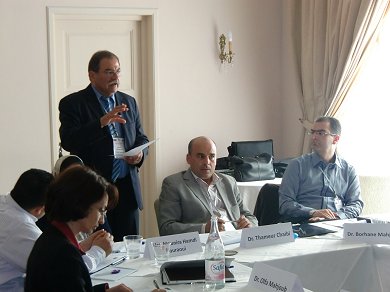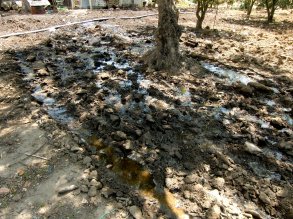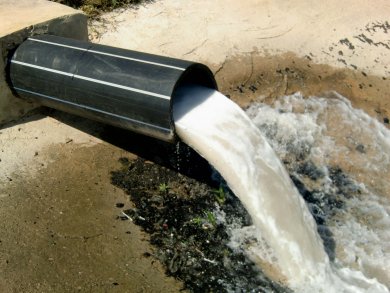The transformation partnership project EM-PO-W-ER Tunisia (EMerging POllutants in Water and WastewatER in Tunisia) intends to initiate a dialogue at scientific, educational, socio-cultural, and political levels on probably the most emerging topic in the Middle East “Water and its Scarcity”. Water is essential for the development of the area in terms of food production, health, and prosperity, thereby supporting the transformation process and political stability through meeting the demands of the people.
In the course of this project, which started in March 2012, a professional and intercultural dialogue between Tunisian and German scientists, students, and stakeholders will be initiated that helps find solutions not only in terms of technical measures, but also for common intercultural understanding and trust.

Professor Müfit Bahadir (standing), Technical University of Braunschweig, Germany, with (seated from left to right) Dr. Olfa Mahjoub, National Research Institute for Rural Engineering, Water, and Forestry (INRGREF), Tunis, Tunisia, Dr. Thameur Chaibi, National Institute for Research on Rural Engineering, Ariana, Tunisia, and Dr. Borhane Mahjoub, High Institute of Agronomy, Sousse, Tunisia.
The Project EM-PO-W-ER Tunisia aims at building a network between universities, research centers, stakeholders, and policy makers to monitor the current situation of wastewater reuse in Tunisia and other Arab Countries with an emphasis on emerging pollutants in reclaimed wastewater and irrigated agricultural environments (water bodies, soil and groundwater) and thereby building capacity of students and researchers.
Also the links to Euro-Mediterranean Countries will be enhanced through the German partner. This aims to develop a greater R&D follow up project for the entire Mediterranean Sea Region thereby linking South and North.
The project is jointly conducted through the Technical University of Braunschweig, Institute of Environmental and Sustainable Chemistry, Braunschweig, Germany, the University of Carthage, the National Research Institute for Rural Engineering, Water, and Forestry (INRGREF), both Tunis, Tunisia, and the University of Sousse, Higher Institute of Agronomic Sciences of Chatt-Meriem ISA CM, Sousse, Tunisia, and is funded for 2012 – 2013 through the German Academic Exchange Service (DAAD – Deutscher Akademischer Austauschdienst).
Objectives:
- Stock taking of the current situation of emerging pollutants in water resources,
- Identifying the gap in environmental knowledge and developing suitable solutions,
- Further education and training courses for analytical and laboratory skills,
- Setting up a database for dealing with emerging pollutants in water for irrigation,
- Dissemination of the results through workshops and stakeholder conferences.
To achieve these objectives, the project is structured in several work packages:
- Building a Professional Management Structure for Project Coordination
This will include upgrading the laboratory infrastructure and further education and training of MSc and PhD students, and young researchers on method development, writing and following standard operation procedures (SOPs), good laboratory practice (GLP) and safety measures. - Conducting Scientific Research
This will include the development of R&D projects on water treatment, based on renewable energy and re-growing biomass, data mining for existing water pollutants available from Tunisian public authorities, method development for the analyses of emerging pollutants in water and irrigated land (Pharmaceuticals and Personal Care Products (PPCPs), drug and pesticide residues, polycyclic aromatic hydrocarbons (PAHs), polychlorinated biphenyls (PCB), organochlorine pesticides (OCP), endocrine disrupting compounds (EDC) like linear alkyl benzene sulphonates (surfactants) (LAS) derivatives, etc.), and confirmation analyses in Braunschweig with modern hyphenated analytical techniques. - Analyzing Data and Comparison with Euro-Mediterranean Countries
This aims to achieve the identification and filling of existing gaps of knowledge and skills by harmonization of analytical methods and conducting comparative studies on emerging pollutants to gain reliable data, investigation and monitoring emerging pollutants in countries that lag behind regarding the reuse of reclaimed water and identifying the priority pollutants, and the creation of a database for water pollution in the Mediterranean Sea Region. - Building Capacity through Further Education and Results Dissemination
This encompases organization of national and international conferences jointly with Environmental Scientists from the global Exceed Network of 35 universities on 4 continents (Excellence Center for Development Cooperation on Sustainable Water Management in Developing Countries) and euro-mediterranean countries, establishing a regional information system for know-how transfer, staff training, and exchange of information, and development of joint R&D projects on environmental and water topics. - Identification and Involvement of Stakeholders and Institutions
This will be achieved by identification and involvement of the governmental organizations (GOs) and nongovernmental organisations (NGOs) for water management in Tunisia, and cooperation with stakeholders like farmers’ associations as consumers of irrigation water. - Dissemination to Stakeholders and Decision Makers
This includes regular information exchange with GOs, NGOs, agencies, and ministries, as well as publishing newsletters, periodicals, and leaflets as information material for stakeholders, and organizing regular stakeholder workshops for results dissemination.
The first year of the project will focus on establishing the coordination and management structures, data mining and evaluation regarding the topic of emerging pollutants, organization of a stakeholder workshop and discussing the project aims and course with scientists from MENA (Middle East and North Africa), MESAEP (Mediterranean Scientific Association of Environmental Protection), and Exceed, as well as starting the exchange training program for residual analytical techniques. 2013, in the second year of the project, it will see the selection of experimental sites and analysis of water and soil samples for emerging pollutants. The third year will focus on continuing the analysis and extending the collaboration as well as organizing an international symposium in Tunisia on emerging pollutants in water bodies.
It is hoped that as the energy and water sectors are two of the most important economic drivers in the region and Tunisia’s economy relies on agriculture, creating a strong research team in Tunisia will give answers to open questions on the future of the Mediterranean Sea Basin, which is the aim of the DAAD Project EMPOWER Tunisia.
Within the frameworks of the two projects Exceed and EMPOWER Tunisia there are many opportunities for scientific contributions and students’ participation through exchange. Further information can be gained from the Exceed website and from the chairperson on request.
 Müfit Bahadir was born in 1947 in Istanbul, Turkey, and studied chemistry in Berlin and Bonn where he gained his Ph.D. After working as a R&D manager at the Ruhrchemie AG, Oberhausen, Germany, he began working for GSF-National Research Center of Environment and Health, Munich, Germany, (today: Helmholtz Centre Munich) where he became the vice-chairman of the Institute of Ecological Chemistry. At the same time, he qualified as Assoc. Professor at the Technical University of Munich-Weihenstephan, Germany. In 1989, he was offered the professorship for Ecological Chemistry and Waste Analysis at the Technical University of Braunschweig, Germany, and he founded an Institute of the same name. In the meantime, the institute was renamed to “Environmental and Sustainable Chemistry”.
Müfit Bahadir was born in 1947 in Istanbul, Turkey, and studied chemistry in Berlin and Bonn where he gained his Ph.D. After working as a R&D manager at the Ruhrchemie AG, Oberhausen, Germany, he began working for GSF-National Research Center of Environment and Health, Munich, Germany, (today: Helmholtz Centre Munich) where he became the vice-chairman of the Institute of Ecological Chemistry. At the same time, he qualified as Assoc. Professor at the Technical University of Munich-Weihenstephan, Germany. In 1989, he was offered the professorship for Ecological Chemistry and Waste Analysis at the Technical University of Braunschweig, Germany, and he founded an Institute of the same name. In the meantime, the institute was renamed to “Environmental and Sustainable Chemistry”.
Professor Bahadir has authored over 220 peer-reviewed publications, edited nine books, and holds ten patents. He is Editor-in-Chief of CLEAN – Soil, Air, Water and member of editorial boards for a number of renowned journals, e.g., ChemSusChem. From 2001 to 2003 he was president of MESAEP (Mediterranean Scientific Association of Environmental Protection). In 2006 and 2011 he was awarded with the UNESCO-Award: Education for Sustainable Development.
Bahadir is best known for his research in the area of Environmental Chemistry of inorganic and organic pollutants, their fate and impacts on organisms and ecosystems (ecotoxicology). His studies involve also green chemistry in education and research on sustainable products and processes.
- M. Bahadir on Sustainable Water Management
Müfit Bahadir speaks about sustainable global water management, student mobility, international cooperations and the Exceed Project - News: UNESCO Awards Sustainable Organic Lab Course
NOP, the Sustainability in the Organic Chemistry Lab Course, was recognized by the UNESCO with the UNO Dekade prize - Institute of Environmental and Sustainable Chemistry, TU Braunschweig, Germany
- Müfit Bahadir




